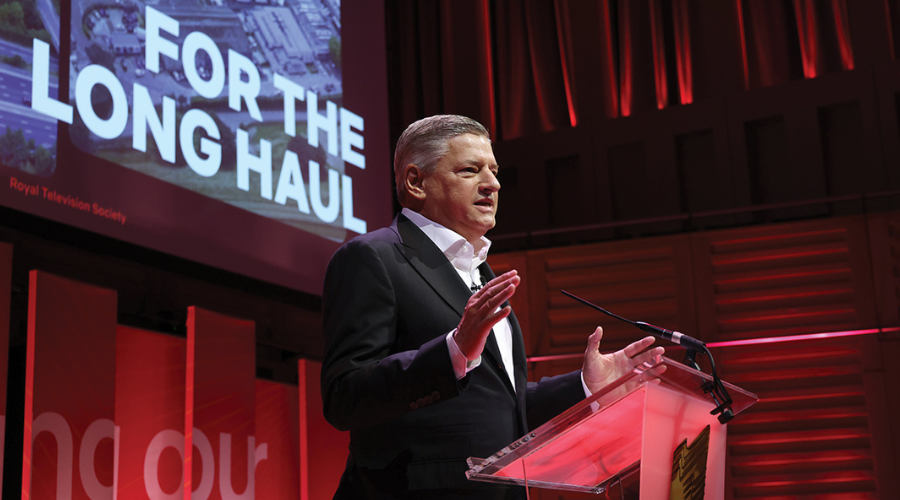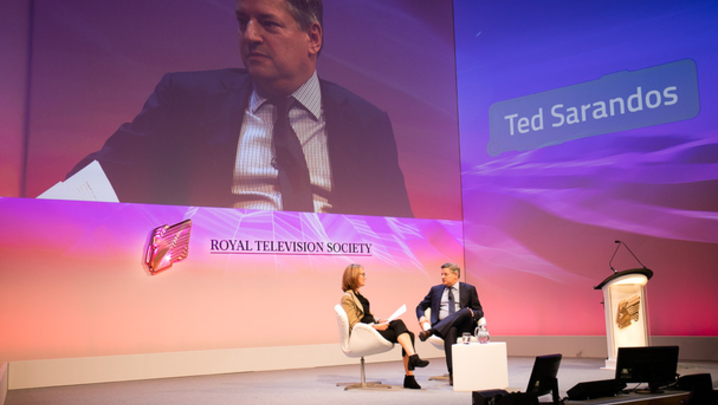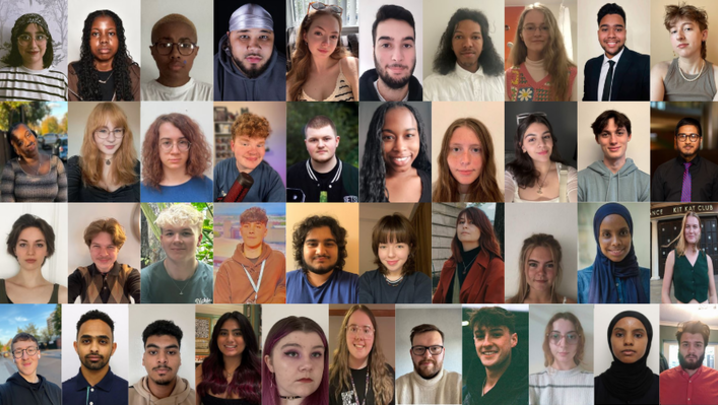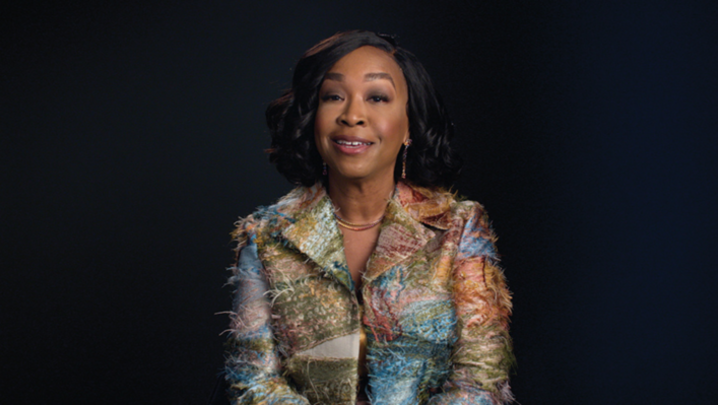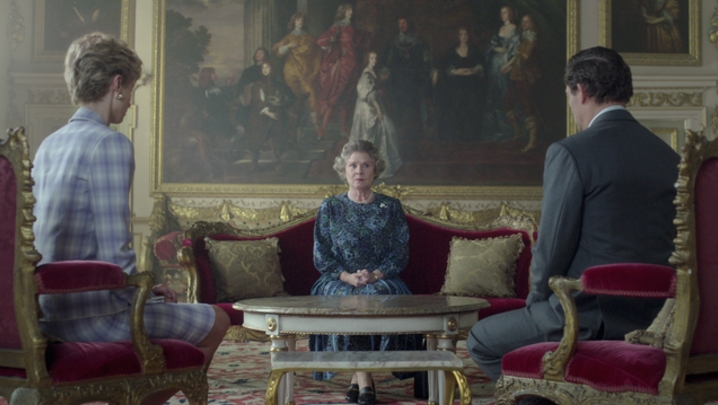The Netflix chief lauds the UK’s creativity and its part in the growth of the streaming giant
Netflix Co-CEO Ted Sarandos opened the RTS London Convention with a generous address that highlighted the role British TV has played in the US streamer’s rise to global dominance. Emphasising Netflix’s many UK productions and its heavy investment in studios, he said: “We couldn’t be more excited to be here – and, believe me, we’re not going anywhere.”
The RTS, said Sarandos, holds “a special place in my heart”, recalling that at the 2016 London Convention he premiered a trailer for the first season of The Crown, “a show that stood conventional wisdom on its head”.
Warming to the theme, Sarandos added: “Peter Morgan’s pitch was for a six-season show with a rotating cast, a show that would take 10 years to produce. It was something no one had ever tried before and that most people thought would never work.
“The Crown is a perfect example of why Britain remains one of the best places for TV and film. You have some of the best writers, directors, producers, actors, crafts, crew and locations anywhere in the world.”
The proof is in the pudding. He revealed: “Netflix invests more here in the UK than any other country outside the United States. Since 2020, we’ve invested $6bn in the UK creative community — and worked with more than 30,000 cast and crew. Today we have over 100 productions active in the UK.”
The Netflix chief went on to pinpoint the reasons that made the UK – one of 190 countries around the world in which the streamer operates – the most attractive of production partners. “You have great public service broadcasters and institutions that nurture British talent and creativity…. You’ve consistently supported regulations that encourage creativity, innovation and long-term thinking.
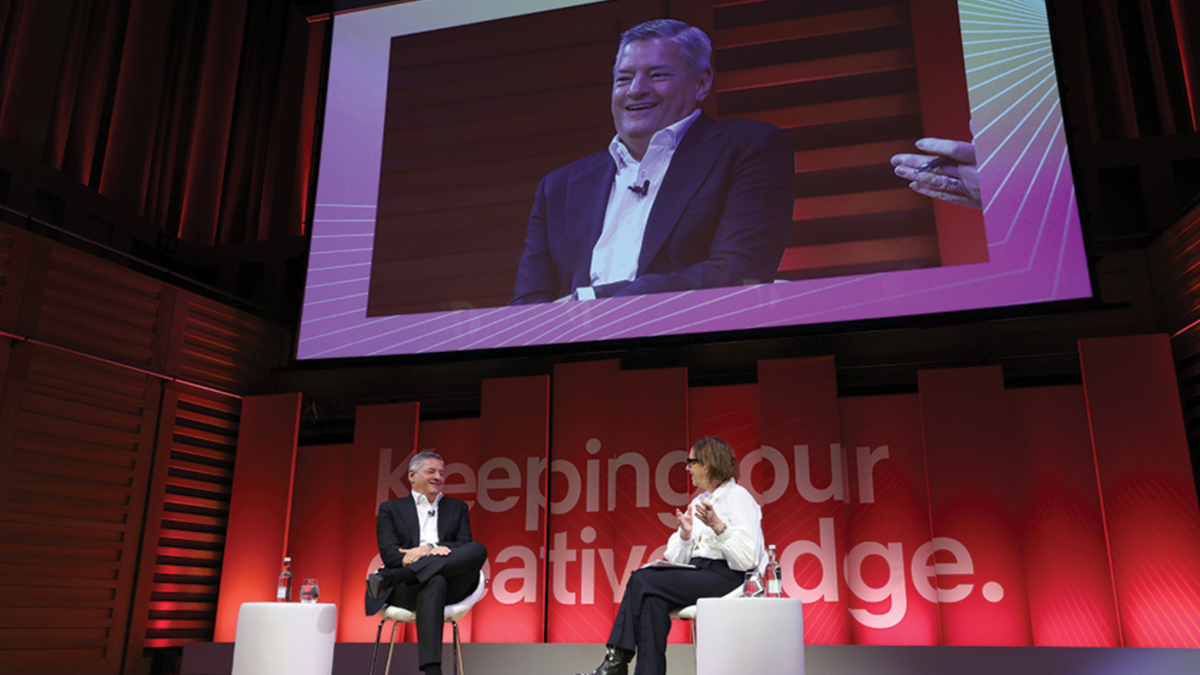
(credit: Tim Whitby)
“You invested in education and training in the creative arts at every level, as well as investing in your amazing facilities. All of which have been supported by highly competitive tax incentives which make the UK an even more attractive place for anyone looking to make a film or show.”
With the audience of British broadcasting executives almost audibly purring, Sarandos offered a succinct analysis of the lessons he had learned since Netflix moved outside the US and into every major TV territory worldwide. “To succeed, we need to put the audience first – and that means embracing change,” he said.
“Today, choice and control are the price of admission in modern entertainment. It’s streaming that consumers want. And it’s how our industry stays relevant – and grows – in the face of intense competition from all directions.”
Sarandos admitted that Netflix has had its own struggles in adapting to the ever-changing media landscape. “When we first started streaming, the technology was not great and neither was the content. We had two big competitors: piracy, which let people stream for free, and our own DVD business,” he said.
“We knew to succeed in streaming that we had to create something better than free – and we also knew we had to let our DVD business go. Because as [former Apple CEO] Steve Jobs said: ‘If you don’t cannibalise your business, somebody else will.’
“So it was painful to split the company in half. We even told our DVD employees they could no longer attend company meetings, so in a sense saying: ‘You are a part of the past, not the future.” But it was the reason that we were able to adapt and grow.
“Today, our members can watch a world of entertainment for a fraction of the price of a DVD box set of The Sopranos in 2007. And they don’t have to wait two months for all those episodes to come out, or for a film to finish its theatrical release.”
TV windows, rights, distribution and technology, Sarandos maintained, though important, are distractions compared with the prime objective of giving audiences what they want – and that is “variety and quality”; namely, prestige dramas, indie films, true crime, romantic comedies, standup, documentaries and reality TV.
He argued: “People have such different and eclectic tastes that you can’t afford to programme for just one sensibility…. It’s no surprise, for example, that those people who loved Beckham also loved Drive to Survive, that’s pretty clear.
"Our members can watch a world of entertainment for far less than the cost of a DVD boxset"
“Now what may surprise you, though, is that people who love The Crown also like Dolly Parton’s Heartstrings. Now, I guess Dolly is royalty in her own right, but that’s again how diverse people’s tastes are.”
Sarandos’s next lesson, one hard won over the years, was the primacy of local programming. “When you try to make something for everyone, you typically end up making something that appeals to no one,” he said.
“It’s why when we greenlight a series or film in the UK, Mexico or Korea, we do it because we think our British, our Mexican and our Korean audiences will love it. When you make something authentic, something that appeals to certain people in certain places, it tends to appeal to a lot of people in a lot of places. Take Supacell, a story about five superpowered south Londoners that became a huge hit in America. Or Baby Reindeer, which was No 1 in the Netflix Top 10 in 79 countries… or Heartstopper, which spoke to a whole new generation of viewers from Brazil to Japan, or The Gentlemen.”
All these shows, he emphasised, were “authentically British, made in the UK for UK audiences by UK creators with UK casts and crews. The other thing these shows all have in common is they were commissioned by a UK team, based here in London, and led by a remarkable Brit herself, Anne Mensah.”
Sarandos admitted that, to a degree, data can guide commissioning choices, but he said that “programming is far more art than science”, adding: “If it were as simple as gathering more data or building the best algorithms, we’d never have a flop. And yet we do – TV and film are subject to hot hands and cold streaks like every other human endeavour.”
He continued: “There’s so much potential in TV today. So much of the fandom right now is driven by younger audiences. We see it in the videos that they create on TikTok… this generation loves stories as much as we ever have – maybe more. We just have to find the right ways to connect with them.
“I know there’s a lot of anxiety in our industry right now — there’s concern about falling investment, there’s the threat of AI and there’s competition from platforms like YouTube and TikTok.”
The Netflix chief acknowledged these hazards but remained optimistic about the future of television: “Every day, people come up to me and want to talk about a new show or film they just watched and loved.
“If we can focus on the audience, embrace change and remain fearless in the stories that we’re telling, I know we’re going to look back 20 years from now and say we really were just getting started.”
Question & Answer
Q: Kirsty Wark: You spend more in the UK than in any other territory [outside the US], but you still only have 10% of viewing. Is that a problem?
A: Ted Sarandos: The 10% that we have is growing…
So, at this point in two years’ time, do you want to be taking 25%?
I don’t think there’s any reason that we couldn’t as long as we continue to do the things [we’ve] just talked about, which is that you really have to keep the audience upfront.
Looking back, did you need a stronger editorial grip on Baby Reindeer – it’s called a ‘true story’, but whose truth?
We are facilitating storytellers to tell their stories – this is Richard’s [Gadd] true story… It’s not a documentary and there are elements of the story that are dramatised. We’re watching it performed by actors on television. It’s a fairly uniquely British debate; this debate is not happening anywhere else in the world.
You want to do more live television. Why?
There’s nothing like those moments when the world comes together at the same time, watches [TV] and goes through an experience together.
More sport?
Some. We did a deal recently to bring two NFL football games to Netflix around the world on Christmas Day this year … we’ve got this Mike Tyson v [YouTuber] Jake Paul fight coming up around the world – those are events people love.
Would you ever have a political debate show?
The challenge for our company is to entertain the world; political debate is a form of entertainment but we tend to try to give people some refuge from the political discourse.
You say you’re going to put the price up. Where’s the justification for that?
I’m not saying we’re going to be putting the price up… we have to bring [viewers] more value for the dollar and then, every once in a while, we have to come back to you and say, ‘We’d like to have a little more money’ so we can keep putting into this virtuous circle of constant improvement… If you don’t think you’re getting value for the dollar at Netflix, it’s a ‘one-click cancel’.
Session 1: ‘International keynote: Ted Sarandos’. The Co-CEO, Netflix, was in conversation with journalist and writer Kirsty Wark. The producer was Helen Scott. Report by Matthew Bell.

